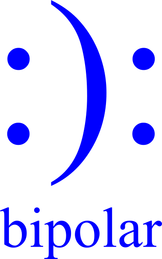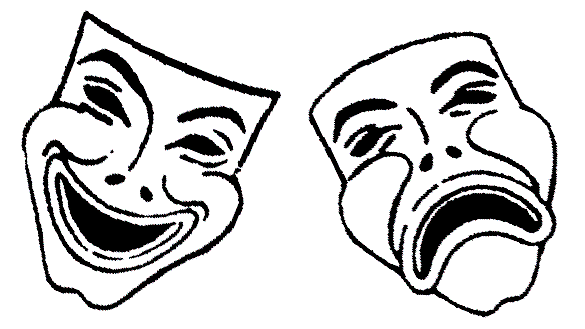BipolarIn order to receive a proper diagnosis of bipolar, a patient must fulfill criteria for having had a major depressive episode, as well as a manic episode. Bipolar isn’t just sometimes I’m happy and sometimes I’m sad, like many think. Bipolar is a real, debilitating, organic disorder that is not currently curable.
Due to the organic nature of the disorder, the symptomatology is not in response to anything that is going on in the environment. A bipolar patient’s mood is predominantly due to cycles of the brain. Some are more rapid cycling, at the low end cycling over the course of only a couple days, and some are more lengthy, occurring over several months. Contrary to what some may believe, Bipolar patients do not go through spells of major depression and mania all in the same day. While a bipolar patient can indeed be made happy or sad due to environmental stimuli just like anyone else, it is the baseline mood that we are interested in for bipolar. Think of mood as a wave with the high end. In bipolar patients, the wave is much more exaggerated than in people without bipolar, and in fact exceeds what we would call a clinically significant threshold. The goal of therapy in this diagnosis is an attempt to force that wave as close to the middle as possible so that the swings are not nearly as severe and debilitating. The following is the criteria for Bipolar Disorder. Note that a patient must have qualified for both manic and major depressive episodes at some point. Manic Episode A) A distinct period of abnormally and persistently elevated, expansive or irritable mood, lasting at least 1 week (or any duration if hospitalization is necessary) B) During the period of mood disturbance, three (or more) of the following symptoms have persisted (four if the mood is only irritable) and have been present to a significant degree: 1) inflated self-esteem or grandiosity 2) decreased need for sleep (e.g., feels rested after only 3 hours of sleep) 3) more talkative than usual or pressure to keep talking 4) flight of ideas or subjective experience that thoughts are racing 5) distractibility (i.e., attention too easily drawn to unimportant or irrelevant external stimuli) 6) increase in goal-directed activity (at work, at school, or sexually) or psychomotor agitation 7) excessive involvement in pleasurable activities that have a high potential for painful consequences (e.g., engaging in unrestrained buying sprees, sexual indiscretions, or foolish business investments) C) The symptoms do not meet criteria for a Mixed Episode D) The mood disturbance is sufficiently severe to cause marked impairment in occupational functioning or in usual social activities or relationships with others, or to necessitate hospitalization to prevent harm to self or others, or there are psychotic features. E) The symptoms are not due to the direct physiological effects of a substance (e.g., a drug of abuse, a medication or other treatment) or a general medical condition (e.g., hyperthyroidism) Major Depressive Episode A) Five (or more) of the following symptoms have been present during the same 2-week period and represent a change from previous functioning; at least one of the symptoms is either (1) depressed mood or (2) loss of interest or pleasure Note: Do not include symptoms that are clearly due to a general medical condition, or mood-incongruent delusions or hallucinations 1) depressed mood most of the day, nearly every day, as indicated by either subjective report (e.g., feels sad or empty) or observation made by others (e.g., appears tearful). Note: In children and adolescents, can be irritable mood. 2) markedly diminished interest or pleasure in all, or almost all, activities most of the day, nearly every day (as indicated by either subjective account or observation made by others) 3) significant weight loss when not dieting or weight gain (e.g., a change of more than 5% of body weight in a month), or decrease or increase in appetite nearly every day. Note: In children, consider failure to make expected weight gains. 4) insomnia or hypersomnia nearly every day 5) psychomotor agitation or retardation nearly every day (observable by others, not merely subjective feelings of restlessness or being slowed down) 6) fatigue or loss of energy nearly every day 7) feelings of worthlessness or excessive or inappropriate guilt (which may be delusional) nearly every day (not merely self-reproach or guilt about being sick) 8) diminished ability to think or concentrate, or indecisiveness, nearly every day (either by subjective account or as observed by others) 9) recurrent thoughts of death (not just fear of dying), recurrent suicidal ideation without a specific plan, or a suicide attempt or a specific plan for committing suicide B) The symptoms do not meet criteria for a Mixed Episode C) The symptoms cause clinically significant distress or impairment in social, occupational, or other important areas of functioning. D) The symptoms are not due to the direct physiological effects of a substance (e.g., a drug of abuse, a medication) or a general medical condition (e.g., hypothyroidism) E) The symptoms are not better accounted for by Bereavement, i.e., after the loss of a loved one, the symptoms persist for longer than 2 months or are characterized by marked functional impairment, morbid preoccupation with worthlessness, suicidal ideation, psychotic symptoms, or psychomotor retardation. Note that for each, abusing substances automatically disqualifies you from this diagnosis. If you are abusing substances, your diagnosis is some type Substance Abuse, or Substance Dependence. If you read through these criteria and fail to ring up the proper criteria, you do not qualify. Also, if you feel sad because of something, your diagnosis is from the Adjustment Disorder spectrum because you are having difficulty adjusting to a stimulus in your environment. A word of warning. Too often, the thing we see over and over again with Bipolar is a patient who is well managed with proper medications and psychotherapy, is doing well, and then decides they are ok and stop taking their medications and stop going to therapy. As the effects of the medication and therapy wear off, the mood swings will increasingly become more severe until they are fully "off the rails" once again. It can get ugly. Please make sure that if you have been diagnosed with Bipolar to discuss with you doctor or therapist before discontinuing treatment. Their is no current cure for Bipolar. But the symptoms can be maintained and those living with the disorder can live a perfectly normal life. If you or someone you know is suffering from Bipolar, the best, most researched course of action is a combination of pharmacotherapy and psychotherapy. At Pursuit of Happiness, we can offer the proper psychotherapy to help maintain the balance of life that Bipolar tends to disrupt. We can also offer referrals to qualified psychiatrists who can prescribe medications that will attempt to mash the ups and downs to a more manageable level. |
Home - What We Offer - Counseling Dallas - Problems We Handle - How to Pay - Dallas Counselors - What To Expect - Media - Blog and Interviews
Articles and Research - Forums - Cool Videos - Contact Us/FAQ - Locations - Community Resources - Sitemap
Articles and Research - Forums - Cool Videos - Contact Us/FAQ - Locations - Community Resources - Sitemap
Dallas marriage counseling and relationship counseling, individuals, couples, relationship counselor, anxiety counseling, grief
and loss counseling, pain management, coping skills, problem solving, support for serious and/or terminal illness, Family Counselor serving,
Dallas, North Dallas, Plano, Carrollton, Frisco, Richardson
and loss counseling, pain management, coping skills, problem solving, support for serious and/or terminal illness, Family Counselor serving,
Dallas, North Dallas, Plano, Carrollton, Frisco, Richardson
Copyright (c) 2012 Beyond the Gray Sky LLC. All Rights Reserved.
Dallas, TX, 75240
281.836.3704
Dallas, TX, 75240
281.836.3704


